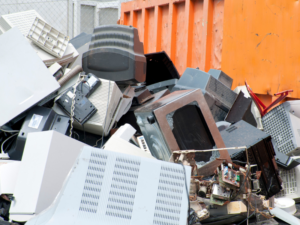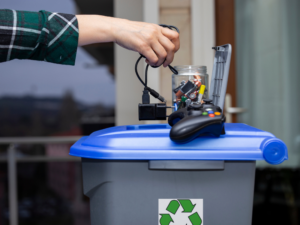Electronic equipment is an integral part of our lives in the workplace and at home. According to a report by the United Nations, the world produces as much as 50 million tonnes of e-waste each year. From computers and copiers to cell phones and other office technology, we rely on many essential electronic equipment products to work efficiently and effectively.
One of the first steps in understanding e-waste problems and solutions is recognizing what is considered electronic waste. Common products that can be categorized as e-waste include but are not limited to the following:
- Laptops
- Monitors
- Computer Components (CPUs, processors, etc.)
- Keyboards
- Printers
- Phones
- Fax machines
- Televisions
When it comes time to replace our old electronics, it is important to do so properly so we are not contributing to the growing global e-waste problems.
Why is E-Waste a Problem?
The challenges posed by e-waste are multifaceted, making it crucial to address the disposal of electronics responsibly. Unlike conventional office waste, electronics are imbued with various hazardous chemicals. When these devices end up in landfills, these chemicals can seep out, emphasizing the need for effective e-waste management strategies. Such leakage poses environmental threats and can lead to legal repercussions, including liability lawsuits stemming from improper disposal practices.
Furthermore, when e-waste is carelessly discarded in landfills or abandoned by roadsides, its toxic components can contaminate the soil and groundwater. This environmental degradation jeopardizes both wildlife and human populations. The severity of these e-waste-related hazards is so pronounced that many states have enacted laws prohibiting the improper disposal of electronics.
How to Reduce and Recycle Electronic Waste
Given the growing concerns surrounding e-waste, one might wonder about potential solutions. Fortunately, there are several strategies individuals and businesses can adopt to mitigate their e-waste footprint.
So, are you wondering about a possible solution for the growing e-waste problem? Here are a few methods you can employ to reduce your e-waste output.
1. Sell or Donate Old Electronics
One of the many ways you can ensure that your e-waste does not end up in a landfill is by reselling your old electronics that still work. With marketplace apps like Letgo becoming increasingly popular, finding a buyer for your old electronics is as easy as ever. You can dispose of old electronics and make a quick buck, too.
If you feel charitable, donating your old electronics to charity is another way to breathe new life into your old tech. Michael Miller with VPNOnline always donates his used devices. “Many don’t seem to be aware, but most electronic devices have harmful elements to our environment. That’s why instead of throwing away my old gadgets, I donate them to others.”
Many local charities would be more than willing to take an old TV or computer off your hands. Second-hand stores like Goodwill are nationwide and will accept working electronics for donation. By selling or donating your old electronics, you are ensuring that your old tech is staying out of landfills and finding renewed use with someone else, helping to curb many of the e-waste problems.
2. Treat Your Electronics Right
How often have you heard stories of friends or family needing to purchase a new phone because they broke their last one? One of the most effective solutions for e-waste is treating your tech respectfully. This ensures that your tech will last long and stay out of a landfill.
There are many ways to maintain different pieces of technology. Placing a protective case or screen protector on your phone is one way to prolong its life. You won’t need to dispose of a broken phone if it isn’t broken in the first place!
For computers, cleaning the insides of dust or dirt is another way to improve their lifetime usage. Not charging the device to 100% for any electronic device will prolong its battery life. A good battery will keep your device fast and operating for a long time. Properly maintaining your electronic devices will keep them in your possession and out of landfills for longer.
Additionally, if your device is broken or having issues, try fixing it before tossing it and buying the newest model. This can add a few months or even years to your device. Shayne Sherman with Car Passionate tells us, ” Really try fixing your technology before you throw it away. Search for places in your local area that would be able to help with that. There are even lots of free workshops happening nowadays.”
If you need to replace your cell phone, learn how to upcycle your cell phone battery.
3. Recycle Your E-Waste
In an ideal world, companies would offer incentives for users to return their old tech to be recycled, but often that is not the case. Daniel with Zippy Electronics says, “The best way to address the growing e-waste problem worldwide is by encouraging the companies that produce electronic products to have doable and reliable recycling programs for their own products.”
Unfortunately, and more often than not, it’s left up to the user to find a place to recycle their broken or outdated device. And while finding the proper recycling channels may take some effort, it is worth it to help prevent devastating e-waste problems.
Many retail stores give customers options to bring their old electronics for various purposes. Trading in old electronics for cash or credit towards new technology is a common practice. There are also electronic recycling businesses whose job is to dispose of your e-waste safely and securely. So, not only is recycling your electronics one of the best solutions for e-waste, but it can also benefit your wallet, too!
If you are a business looking to recycle your e-waste responsibly, we can help. At Newtech Recycling, we are committed to creating a safe and sustainable corporate electronic recycling process for you and your business. Through our extensive range of service options, we will help to dispose of any and all electronic waste and data that you need to be removed.
The Importance of Reducing and Recycling E-Waste
In our technologically driven age, the surge in electronic consumption is undeniable. While enhancing our daily lives, these devices have also led to an alarming rise in e-waste. The environmental repercussions of improper e-waste disposal are severe. E-waste often contains hazardous materials like lead and mercury, which, when discarded carelessly, can contaminate our water sources and harm the ecosystem.
Beyond the environmental concerns, there’s an economic perspective to consider. Electronics are rich in valuable materials such as gold and copper. Recycling prevents environmental degradation and reclaims these precious resources, reducing the need for environmentally harmful mining. Furthermore, recycling e-waste can stimulate economic growth by creating jobs in the recycling sector and reintroducing recovered materials into the production cycle.
Safely Dispose of Electronic Waste with Newtech Recycling
At Newtech Recycling, our corporate duty is to ensure that the right environmental practices are employed when disposing of any e-waste your businesses might produce. No matter the size of your business, we are here to handle any amount of e-waste your company needs to be removed.
When you work with us, you ensure that you protect the environment safely and responsibly. Contact us today to learn about our solutions for e-waste recycling in New Jersey, Pennsylvania, New York, and Connecticut.



